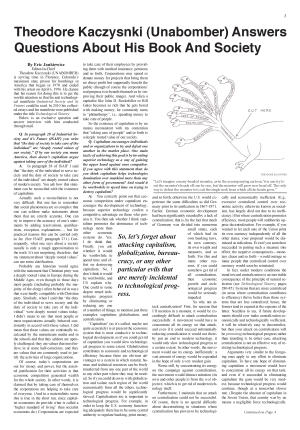John Jay Sentinel Volume 3, No 3
John Jay Sentinel Volume 3, No 4
Retreived through searching CUNY Academic Works.
Ted Kaczynski
Ted Kaczynski’s Interview with the John Jay Sentinel
1. Theodore Kaczysnki (Unabomber) Answers Questions About His Book And Society
Theodore Kaczynski (UNABOMBER) is serving time in Florence, Colorado’s maximum state prison for bombings in America that began in 1978 and ended with his arrest on April 6, 1996. He claims that his reason for doing this is to get the worlds attention so that his anti technological manifesto (Industrial Society and its Future) could be read. In 2010 his collected essays and his manifesto were published under the title Technological Slavery.
Below is an exclusive question and answer interview with him conducted through mail.
In paragraph 28 of Industrial Society and it’s Future (ISAIF) you write that “the duty of society to take care of the individual” are “deeply rooted values of our society.” If by our society you mean America, then doesn’t capitalism argue against taking care of the individual?
In paragraph 28 of ISAIF I said that “the duty of the individual to serve society and the duty of society to take care of the individual” are deeply rooted values of modern society. You ask how this statement can be reconciled with the existence of capitalism.
Actually such a reconciliation is not very difficult. But one has to remember that social phenomena are so complex that one can seldom make statements about them that are strictly accurate. One can try to improve the accuracy of one’statements by adding reservations, qualifications, exception, explanations…, but for practical reasons this can be carried only so far. (See ISAIF, paragraph 231.) Consequently, what one says about a society usually is only a rough approximation to the truth. It’s not surprising, therefore, that my statement about “deeply rooted value” can use some clarification.
Probably any historian would agree with the statement that Christian piety was a deeply rooted value in Europe during the Middle Ages, even though in those days most people (including probably the majority of the clergy) often behaved in ways that were hardly compatible with Christian piety. Similarly, when I said that “the duty of the individual to serve society and the duty of society to take care of the individual” were deeply rooted values today, I didn’t mean to say that most people or most organizations actually behaved consistently in accord with those values. I did mean that those values are continually inculcated by the mainstream media and in the schools and that they seldom are openly challenged; they are values that most believe in at some half-conscious; and they are values that are commonly used to justify the activities of large organizations.
Of course, today’s corporations are out for money and power, but the asserted justification for their activities is that economic competition generated wealth for the whole society. In other words, it is claimed that by taking care of themselves the corporations are helping to take care of everyone. (And in a materialistic sense this is true in the short run, since capitalist economies do provide what is called a “higher standard of living” than socialist economies do.) Corporations are expected to take care of their employees by providing them with medical insurance, pensions and so forth. Corporations may spend or donate money for projects that bring them no direct profit but supposedly benefit the public (though of course the corporations’ real purpose is to benefit themselves by improving their public image). And when a capitalist like John D. Rockefeller or Bill Gates becomes so rich that he gets bored with making money, he commonly turns to “philanthropy”, i.e., spending money to take care of people.
So the existence of capitalism is by no means inconsistent with my contention that “taking care of people” and so forth is a deeply rooted value of our society.
Capitalism encourages individuals and or organizations to try and defeat one another in the market place. One main tactic of achieving this goal is by inventing superior technology as a way of gaining the upper hand against ones competitor. If you agree with this statement than do you think capitalism helps technologies domination over mankind more than any other form of government? And would it be worthwhile to spend time on trying to destroy capitalism?
You correctly point out that economic competition under capitalism encourages the development of technology, because superior technology confers a competitive advantage on those who possess it. You then ask whether I think capitalism promotes the dominance of technology more than other economic systems do. Yes, I do think that. Finally, you ask whether it would be worthwhile to spend time and effort on destroying capitalism. No, I don’t think it would be worthwhile, and I’ll explain why. One could to some degree retard technologies progress by eliminating or reducing any one of a number of things; to mention just three examples, capitalism, globalization, and centralization.
“Capitalism” (as it’s called, maybe not quite accurately) is at present the economic system that is most conducive to technological development, so if you could get rid of capitalism you would slow technological progress to some extent. Globalization contributes to economic and technological efficiency because there are obvious advantages to a system in which natural, human, and technical resources can be freely transferred from any one part of the world to any other part where they may be needed. So if you could do away with globalization and isolate each region of the world economically from all the others, technological progress would be significantly slowed. Capitalization too is important to technological progress. For example, in order to keep the U.S. economy functioning adequately there has to be some central authority to regulate banking, print money, and so forth, otherwise the U.S. would experience the same difficulties as did Germany prior to its unification in 1867-1871. Earlier, German economic development had been significantly retarded by a lack of centralization; that is, by the fact that much of Germany was divided into numerous small states, each of which had its own banking laws, its own currency, its own weight and measures, and so forth. For this and many other reasons, if you could somehow get rid of all centralization, then economic growth and technological progress would be seriously impeded.
So why not attack centralization? First, for reasons that I’ll mention in a moment, it would be exceedingly difficult to attack centralization successfully. A movement would have to concentrate all its energy on that attack, and even if it could succeed substantially reducing centralization it would not thereby put an end to modern technology, it would only slow technological progress to a certain extent. In other words, the movement would use its energy inefficiently: a vast amount of energy would be expended in the hope of only a very modest gain.
Worse still, by concentrating its energy on the campaign against centralization, the movement would distract attention (its own and other people’s) from the real objective, which is to get rid of modern technology itself.
Furthermore, I maintain that an attack on centralization could not be successful. Of course, there is no special difficulty about decentralizing in situations where centralization has proven to be technologically and economically inefficient. (E.g., excessive centralized control over economic activity, otherwise known as socialism, has largely died out due to its inefficiency.) But where centralization promotes efficiency, most people will stubbornly oppose decentralization. For example, if you wanted to let each sate of the Union print its own currency independently of all the other states, your proposal would be dismissed as ridiculous. Even if you somehow succeeded in putting such a measure into effect, the negative consequences—monetary chaos and so forth—would outrage so many people that centralized control over currency would soon be reinstated.
In fact, under modern conditions the trend toward centralization is an inevitable consequence of the principle of natural selection (see Technological Slavery, pages 280-85): Systems that are more centralized (in areas where centralization contributes to efficiency) thrive better than those systems that are less centralized; hence, the former tend to expand at the expense of the latter. Needless to say, if future developments should ever make centralization economically and technologically inefficient, it will be relatively easy to decentralize; but then your attack on centralization will be promoting technological progress rather than retarding it. In either case, attacking centralization is not an effective way of resisting technological progress.
Arguments very similar to the foregoing ones apply to any effort to eliminate capitalism. To have any hope of eliminating capitalism a movement would have to concentrate all its energy on that task, and even if it succeeded in eliminating capitalism the gain would be very modest, because technological progress would continue, though at a somewhat slower rate. (Despite the absence of capitalism in the Soviet Union, that country was by no means a negligible force technologically We all know that the Soviet Union was the first country to put an artificial satellite into orbit; and the soviets developed the world’s first successful jet airliner, Tu-104.)
Thus, an antitechnological movement that focused on the elimination of capitalism would expend vast energy in return for vey little gain. What is worse, by focusing on capitalism the movement would distract its own and other people’s attention from the real objective, which is to get rid of modern technology itself.
Furthermore, people would obstinately resist the loss of economic efficiency entailed by the replacement of capitalism with socialism. And even if you could somehow replace capitalism with socialism, capitalism would soon reappear and become dominant because it is economically and technologically more vigorous than socialism. This again is guaranteed by the principle of natural selection (Technological Slavery, pages 280-85) and is confirmed by experience: When the socialist countries of eastern Europe couldn’t keep up with the West economically or technologically, they reverted to capitalism. Sweden once was ideologically socialist, but in practical terms socialism never actually got very far in that country, and Sweden today is still capitalist. While remaining nominally socialist, China for the sake of economic growth now allows a good deal of private enterprise (i.e., capitalism) in its economy. Venezuela’s dictator, Hugo Chavez, talks about socialism, but in practice he leaves most of the country’s economy in the hands of private enterprise because he doesn’t want the drastic decline in economic efficiency that would result from the elimination of capitalism. I know of only two countries left in the world that are left of capitalism: Cuba and North Korea. No one wants to imitate Cuba and North Korea, because they are (from a materialistic point of view) economic failures.
So, as long as we live in a technological world, there’s no way we will get rid of capitalism unless and until it is superseded by some system that is economically and technologically more efficient.
The arguments I’ve outlined here in reference to centralization and capitalism are equally applicable to globalization, bureaucracy, environmental destructiveness, or any one of numerous other evils the elimination of which would merely impair the functioning of the technological system without actually eliminating modern technology. As long as society remains saturated with the values of the technological system, people will not accept any measures that significantly impair the functioning of that system. In order to get people to accept such measures, you would first have to convince them that the supposed “benefits” of modern technology are not worth the price that must be paid for them. Thus, your ideological attack must be focused on modern technology itself. An attempt to eliminate capitalism, globalization, centralization, or any other subordinate evil can only distract attention form the need to eliminate modern technology.

So, let’s forget about attacking capitalism, globalization, bureaucracy, or any other particular evils that are merely incidental to technological progress.
2. Kaczynski Returns
This article is the second installment of a three part series concerning Theodore Kaczynski, the Unabomber. In this installment, Kaczynski answers questions about crime and what would happen to society if technology was destroyed. If you have any responses, such as questions or replys, write a letter to the editor.
On page 104, paragraph 210, you write, “there is no reason to believe that anyone would be interested in rebuilding society” if it were destroyed. Then why did humans build technology to begin with?
In paragraph 210 of ISAIF, I said that if the technoindustrial system were thoroughly broken down and remained broken down for a generation or so, “there is no reason to believe that anyone would be interested in rebuilding industrial society.” You ask: “Then why did humans build technology in the first place?”
At least until the 17th century, humans did not build technology as a result of any interest in creating an industrial society; technological progress was until then an unconscious and unintentional process. For example, it’s safe to say that the man who invented the horse collar (an important technical innovation of the Middle Ages) didn’t do so because he wanted to build a technologically advanced society. He did so only in order to solve some problem in his own personal life. Maybe he just got tired of the slow speed at which his ox pulled a wagon. He knew that a horse could go much faster than an ox, but the yoke used with oxen wasn’t suitable for horses, so he devised a horse collar that would enable his horse to pull a wagon.
Not until approximately the 17th century did people begin to think of progress as a goal, and even then probably only a small minority consisting of intellectuals thought in terms of progress. I doubt that there was any widespread enthusiasm for progress before the Industrial Revolution got going during the latter part of the 18th century. After that, a belief in progress probably did contribute to technological development. But even then the main driving force behind progress was no an aspiration to build a technologically advanced society but competition for money and power, plus the need for surrogate activities.
If the technoindustrial system were overthrown today the world would be brought down to a technological level lower that that of the Middle Ages, because many of the techniques if the medieval times have been lost. No doubt the slow and unintentional process of accumulating technology bit by bit would occur again, just as it did the first time around. When I wrote that there was no reason to believe that anyone would be interested in rebuilding industrial society, my point was that people wouldn’t be saying, “Hey, let’s figure out how to make the light bulbs and generators so we can have electric light,” or “Let’s reinvent internal combustion engines and oil refineries so we can have cars.” Peasants or warriors would be concerned only to cultivate their land with simple implements or to fight with lance and sword; they wouldn’t be pursuing impractical dreams of tractors and machineguns.
Any concerted effort to rebuild an industrial economy would yield significant practical returns only after a vast expenditure of time, effort, and resources—a far greater expenditure than any submedieval society could afford. So, if an industrial society could be rebuilt at all, it could be rebuilt only through the same slow process, spanning many centuries, that was required the first time around. See ISAIF, paragraphs 210-12, and Technological Slavery, pages 333-34.
.




